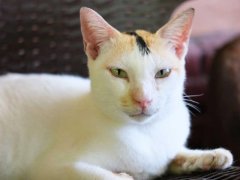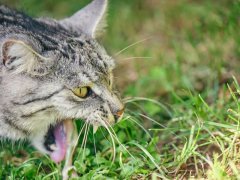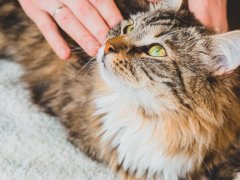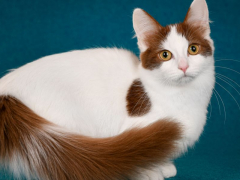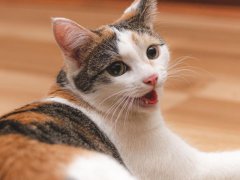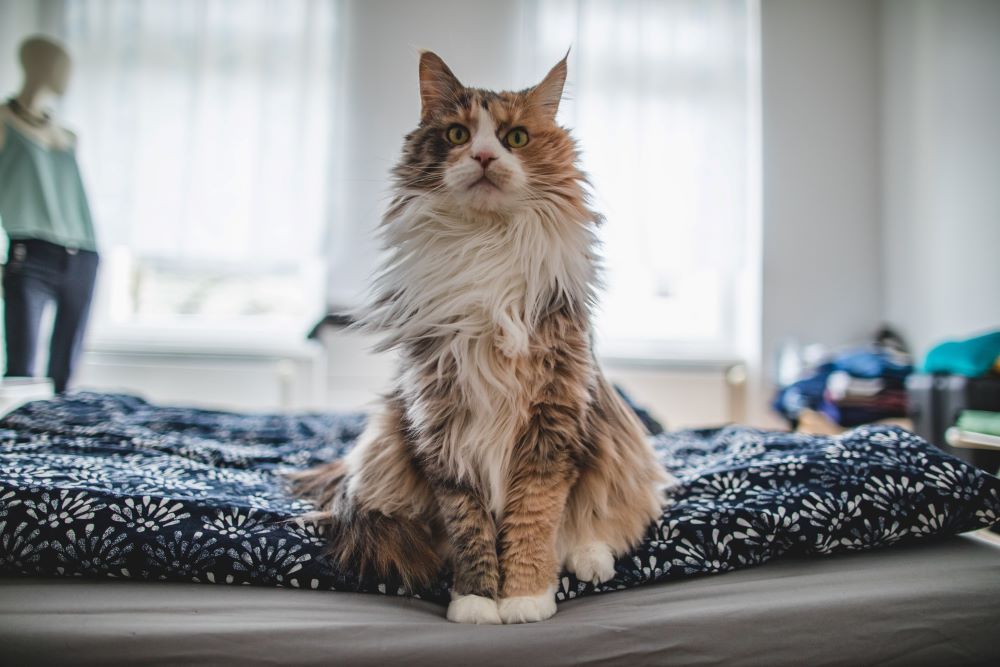
If you notice that your cat is losing hair, it’s important to determine if the hair loss is normal or abnormal. Cats can lose their hair for many different reasons. Shedding, for example, is an example of normal hair loss. Outside of typical shedding, hair loss is generally abnormal and requires investigation.
Normal Hair Loss: Shedding
Whether a lot or a little, most cats shed year-round. Additionally, some cats shed more at certain times of the year, generally in the spring and summer, as temperatures warm up. With seasonal shedding, your cat might lose more hair than she does at other times of the year.
It can be normal for your cat’s hair coat to appear less fluffy and full during the warm summer months, but you shouldn’t see patches of hair loss or bald spots.
Any cat hair loss other than normal shedding is most likely abnormal. Abnormal hair loss is known as alopecia. Many different health conditions can cause hair loss, so it’s important to have your cat examined by a veterinarian if you notice unusual patches, bald spots, or extreme thinning of the hair coat. Another warning sign is clumps or tufts of hair that come out easily when gently pulled.
If you’re not sure if the hair loss is seasonal shedding, try giving your cat a bath. Massage shampoo into the coat, making sure to get down to the skin. Rinse very thoroughly, then dry and brush your cat well.
A good bath, blow-dry, and brushing should remove most of the shedding hair. If you are left with a coat that looks patchy or very thin, or if your cat continues to lose a lot of hair despite the bath and brushing, it’s time to consult your vet.
Causes of Bald Spots in Cats
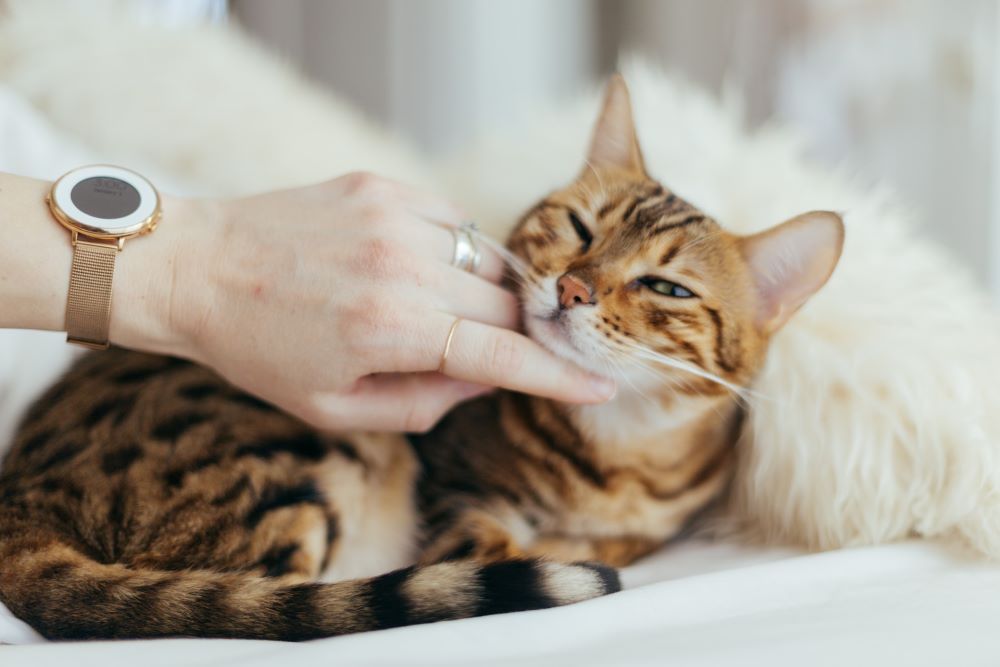
Your cat may start losing hair for a wide variety of reasons, including flea infestation, allergies, skin infections, and more.
The following are just a few of the most common causes of cat hair loss. Some of these conditions are serious, which is why hair loss should always be investigated by your veterinarian.
Allergies (dermatitis): Dermatitis refers to inflammation of the skin. Dermatitis is frequently caused by allergies, including flea allergies, food allergies, environmental allergies, or contact allergies. Skin allergies make the cat very itchy, so she might scratch, lick, or chew on her skin causing lesions, bumps, crusting, scabbing, redness, and hair loss. Sometimes, a cat’s entire belly might go bald.
Fleas and other parasites: Cats with infestations of parasites that live on the skin like fleas, ticks or mites, may experience hair loss as the cat scratches and bites its itchy and irritated skin. Flea bites can even cause allergic reactions in cats, leading to severe skin inflammation and hair loss.
Hormonal issues: Certain hormonal abnormalities like Cushing’s disease (too high of cortisol levels) and hyperthyroidism (overactive thyroid) can cause hair loss. Female cats might lose a lot of their coat after giving birth or nursing her kittens due to hormonal imbalance.
Ringworm: Not a worm at all, ringworm is actually a fungal infection. In addition to causing skin lesion, ringworm can cause hair loss. A telltale sign of ringworm is a circular lesion on the skin in the shape of a ring. Ringworm is highly contagious, not only to cats but to dogs and humans, too.
Skin infections: Skin infections caused by bacteria, yeast or fungus can cause your cat to scratch, lick, or bite at the skin.
Malnourishment: If cats eat an unhealthy diet that does not have the proper balance of nutrients, it can cause malnourishment and lead to many problems including hair loss.
Mange: Much less common in cats than in dogs, mange is caused by an overgrowth of mites living on the skin. Mange causes itchy skin and patchy hair loss.
Old age: It can be normal for senior cats to lose hair during the normal course of aging. Senior cats might have thinner and less fluffy coats. However, as with shedding, patchiness or large areas of missing hair are not normal for older cats.
Over-grooming: Some cats over-groom themselves, causing hair loss. Hair loss due to over-grooming is sometimes caused by stress or anxiety, known as psychogenic alopecia. Over-grooming can also occur when the cat is experiencing itchy skin.
What to Do If Your Cat Has Bald Spots
If you notice your cat shedding more than usual, if your cat’s coat has a thin and moth-eaten appearance, or if you see bald spots or bald patches if missing hair, do not delay seeking treatment from a veterinarian.
Some health conditions that cause hair loss are serious, and if your cat is losing hair because of itchy skin, she might be very uncomfortable. Your veterinarian will be able to determine the cause of your cat’s hair loss, recommend the proper course of treatment, and get your cat’s skin and coat healthy again.
Also Read: How to Groom Your Long-Haired Cat
Treatment
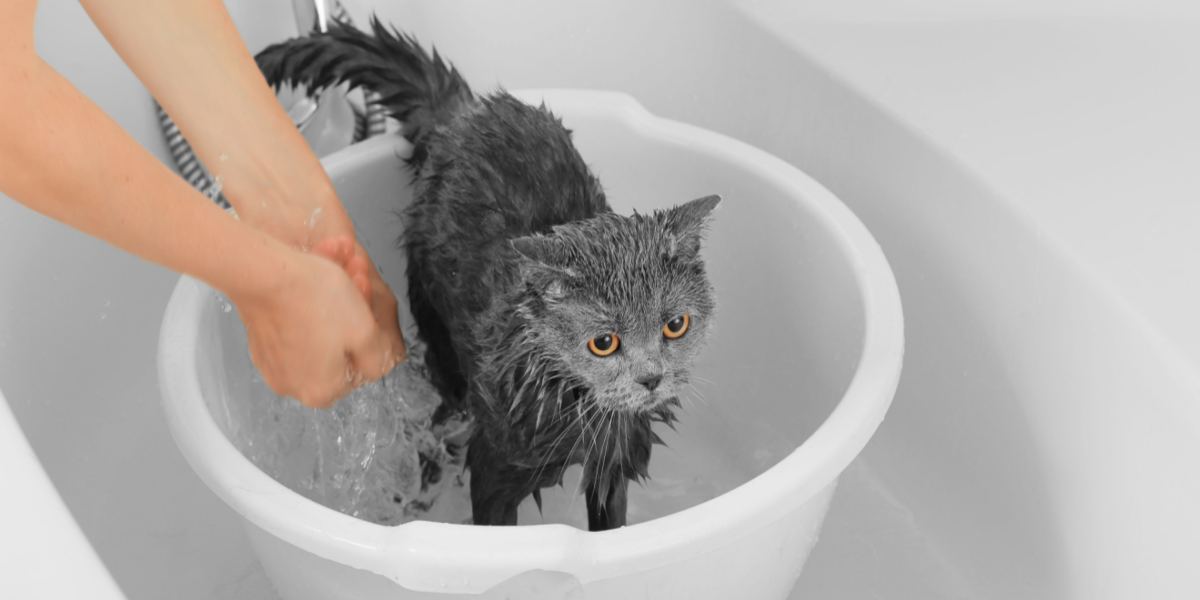
Treatment for alopecia (hair loss) in cats depends on the cause of the hair loss. This is why it’s so important to take your cat to the veterinarian for an exam. The vet will ask questions about the hair loss, examine your cat’s skin and body, and possibly recommend blood tests or other testing. Once the cause of your cat’s hair loss has been identified, your vet might recommend one or more of the following treatments:
Medications: Certain drugs may be necessary to treat the underlying cause of your cat’s hair loss. Skin infections require antibiotics or antifungal medications. In the case of overgrooming due to stress or anxiety, anxiety medication may be prescribed. If the cat is itchy, your vet might prescribe an antihistamine.
Diet: If your cat’s hair loss is caused by malnutrition, your veterinarian might recommend a different food that can address nutritional deficiencies.
Shampoos: Skin infections and mite infestations are often treated with a combination of oral medications and prescription shampoos. Bathing your cat with a moisturizing shampoo can help soothe dry or itchy skin.
Supplements: Certain supplements may improve skin and coat quality. Always ask your veterinarian before adding any supplements to your cat’s diet.
Also Read: 15 Best Cat Foods For Shedding
